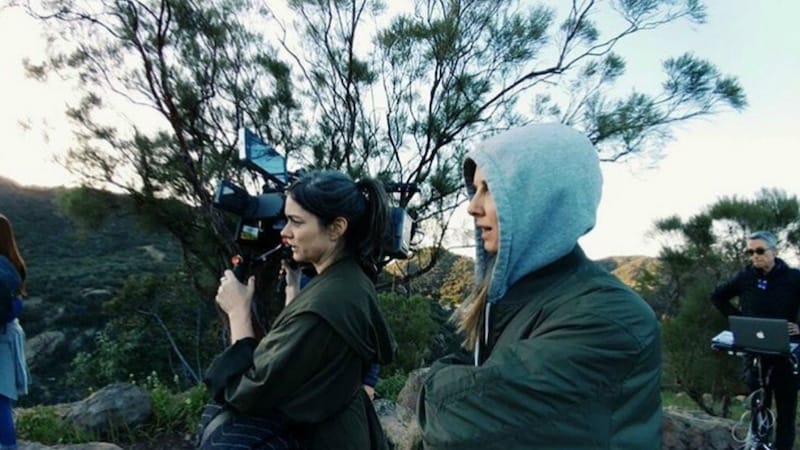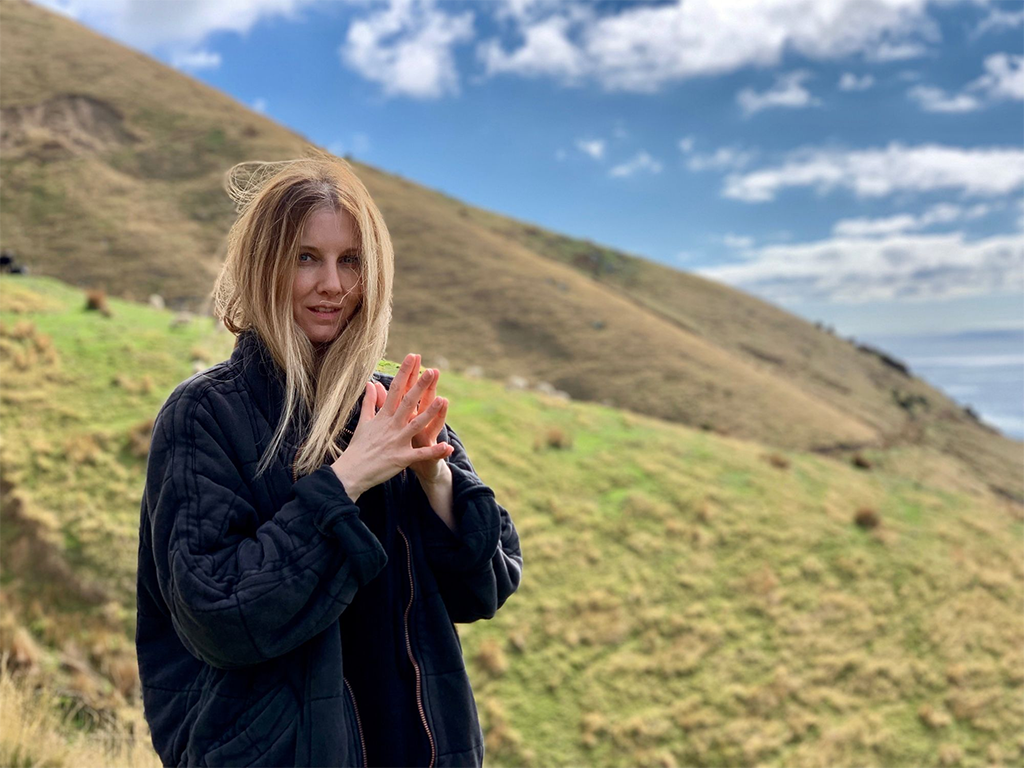Claire Edmondson is going to be a big deal. A few years from now, people will find this post on my blog and be like, "Holy shit, how did Lindsay get to interview her?" This thought is based on a gut feeling, observable talent, and the fact that she's willing to embrace dark, sometimes difficult themes with a fresh perspective. After seeing "EXIT" and talking to her for 45 minutes, I'm pretty hyped on Claire and think you should be, too. Remember the dope, controversial video for Broken Social's Scene's "Sweetest Kill"? It was directed by her!
Since "EXIT" is only fifteen minutes and not available to the public yet (it just screened at the Palm Springs International ShortFest), I'm not doing the little question breakdown before diving into the interview. All you really need to know is that the film follows one woman (Maria Bello) through her day as she confronts a profound decision. Or at least, that's how the marketing copy phrases it. I will just straight up tell you that this is a film about every person's right to die. It isn't politicized or dramatic, but it portrays a tough decision in a very matter-of-fact way that I tremendously appreciate. It was so great to talk to Claire and I hope everyone enjoys our conversation as much as I did.
Interview with Claire Edmondson
Woman in Revolt: What was the reception like during the screening at ShortFest?
Claire Edmondson: It was good, although I was a little bit stressed out. I've shown it at other festivals before and it's been fine, but I walked into this screening and immediately realized how many elderly people were in the audience (per usual for Palm Springs). Assisted suicide is a hot topic for that demographic, so I was incredibly nervous to show the film. I walked in and was like, "Oh, shit. What have I done?"
You could really feel the tension in the room while it was screening. It premiered at TIFF and also showed at a few other festivals, but the vibe in the room wasn't the same. During the Q&A afterwards, a hospice worker who actually helps people die stood up and said that my depiction was really accurate. She said that by the last day of life, most people are really calm and in a good place. She was happy I portrayed it that way because she's seen it done wrong in the past. After her comments I felt relieved.
What I like most about "EXIT" is that it doesn't have any overt messaging. It presents a scenario and leaves the interpretation entirely up to the viewer. The protagonist's suicide is just a thing that happens... there's no real discussion surrounding it.
I always want to stay true to my voice. One of the best compliments the film has ever received is from a programmer who called it "impressively unsentimental." I wanted to show a day in the life of a woman who has made this decision and is owning it. In terms of character backstory, I'm sure she struggled with the decision a month earlier and went through the whole process then, but I just wanted to show the day that it all happened. Sure, she woke up frustrated and spent the morning shooting her gun and letting off steam, but she got to a really good place and had a nice final morning with her daughter.
Speaking of, I like that she has a daughter and doesn't tell her about the suicide plans. It's an interesting treatment that I think is realistic, although I could see people reacting poorly to it.
There have been a few people, usually men, who find it really cold. It all goes back to the unrealistic expectations that are placed on women. It's as if they think becoming a mother strips you of all individuality or something. It was important for me to convey that she still has autonomy.
I talked to several people in the right-to-die movement who mentioned that often, the family is not involved because the patient doesn't want to deal with the whole drama and pain of it – they're already going through so much. The exit guides who show up in the film are very true to life. Many people don't want to die alone but can't invite family or others who might try to talk them out of their decision, so these guides come and sit with them. I thought that was fascinating.
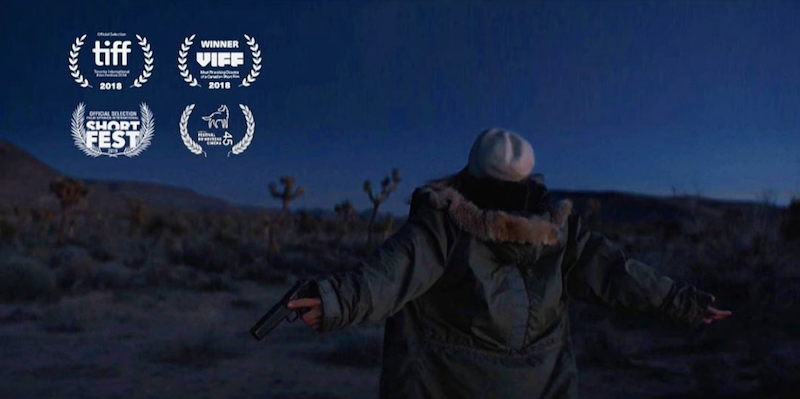
More than anything, this film raises good questions and opens up a dialogue. Would those last moments of life be different if physician-assisted suicide was legal and the idea of it was de-stigmatized in this country? I think so.
I do, too. I'm a big believer in the right-to-die movement. My stance is basically that everyone should have the right to do whatever they want. Going back to your question before, I didn't have much messaging in the film, but I do hope it opens people up to the idea and at least makes them think about the possibility.
Another thing that the people who are part of the movement have said is that it's not a huge conversation right now because it's an old people's problem. Even middle-aged people just aren't thinking about it. A lot of countries are making it legal. Canada has done it, some European countries, and within the states, California is moving towards it. Since the election of Trump, the conversation has taken a bit of a backseat since everyone is focused on fighting for their basic rights.
It's depressing right now and hard to see a bright future in any capacity. I feel like there's a black cloud hovering over everything these days.
When it becomes more of an issue on the national stage, I'm sure the right will cling to it like they do with abortion. One of the guys who runs the Final Exit Network said it's interesting how many Catholic people approach him. The church is very against assisted suicide, but a lot of people come to him and say that they've thought about it and decided their god doesn't want them to suffer. It's creating this divide within the Catholic faith where the church is against it but the people are for it, so I don't know how that's going to develop. I don't follow religion too closely but found that interesting.
I'm not religious in the slightest and really have no idea what's going on with those people, but that is surprising. I remember being younger and getting super depressed when I realized that one day I just wouldn't exist. With each passing year, I totally understand why people find comfort in death. Not to be morbid, but life is hard! I could see myself getting to the point where I just feel done and ready for it all to end. Why shouldn't everyone have the right to make that decision? Sick or not, I don't judge anyone who commits suicide.
I definitely agree.
Did you always envision this as a short?
When I first got into it, I thought I would use it as a proof of concept for a feature. After making it and releasing it into the world, I feel finished with the story. It's a little bit of a bummer because I thought I would expand it, but I don't feel like it's a story I need to tell again. I'm working on a screenplay that sort of touches upon it, but it's very different.
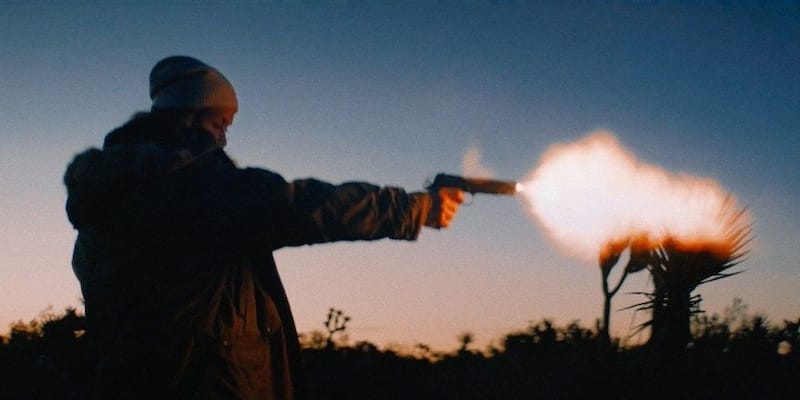
This might be a stupid question, but what typically drives a filmmaker to create a short? Is it usually because of lack of funding or as proof of concept for something longer?
Usually people make a short film as a creative outlet and a stepping stone to a feature. This is something I was told for many years and I definitely saw the benefits. As soon as I made "EXIT" and it did fairly well on the festival circuit, doors started to open for me. It took me years to make the film because I just couldn't get financing. When I started applying for grants six years ago, it was when no one cared at all about female filmmakers. I would look at the list of recipients and it was like... all white men and so frustrating. When I finally got the film made, it definitely felt like a bridge to something more.
I have no desire to make a bunch of short films, although I know there are some directors who do that. I make music videos and commercials, so I've found that I'm constantly honing my skills that way.
Can you talk a little bit more about how you eventually got funding? As someone who doesn't work in the industry, I always find it fascinating to hear about how that process works.
When I finally got "EXIT" financed, it was because of interest in the script. It's such a long, meandering story. It was not an easy route! My commercial agent sent the script to FX (the TV network), because they were thinking about making a short film series. I had a meeting with them, and it all looked very positive but then the whole program got scrapped. But because they were interested in it, my producer friend who is good at getting things financed was like, "Oh, FX was interested? I can work with that." He found me half the funding through private investors that he happens to know. Once we found that money, I put in some of my savings from doing commercials and we financed the rest through a GoFundMe.
We were able to get Maria Bello on board, which was also a huge win and helped tremendously with funding. It was a long, convoluted process but it eventually happened! A lot of people just apply for grants, get them, and make the film; that unfortunately was not how it went for me.
And how did you get Maria Bello?
Al Di, the same producer who helped me get funding, knew Maria's agent. I've always loved her from David Cronenberg's "A History of Violence" (2005) and have been obsessed with her ever since. After she and her agent read the script, we got a meeting with her and it all happened pretty quickly. After trying to get the film made for years, it was a surreal moment.
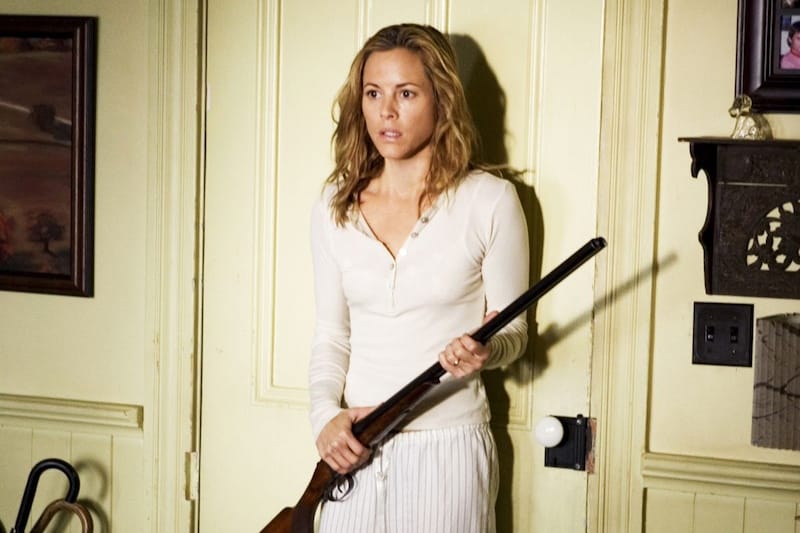
It's nice to hear about the struggle because an outsider might look at your career and think it's been easy. You've done many cool things, like directing music videos for Broken Social Scene and Austra. How did you get into that?
My trajectory is sort of interesting. In high school, I made a few short films with my friends and always wanted to direct. I also loved fashion, costumes, and fashion history. When it came time to think about college, I kind of defaulted to fashion. Like, oh, I'm a girl... this makes sense [laughs]. It seemed like the clear route even though I was probably more into filmmaking. I started assisting stylists and as soon as I got on set, I felt like I made the wrong decision... I wanted to be directing. I continued to work in wardrobe, which was like my own film school. I worked with good and bad directors and learned something from all of them.
I had also started styling bands and became kind of known as a stylist within the music scene. After years of styling, I admitted that I wanted to start directing and convinced some of my musician friends to let me make music videos for them. I knew a lot of people from working in the industry - DPs, grips, gaffers, makeup artists - and was able to start making work with their help.
So it's kind of just like... one thing leads to another, which leads to another, and then you kind of end up where you want to be.
I took a bit of a detour to get there, but yes. You start college when you're so young and it's hard to know exactly what you want to do. If you have any kind of ambition, I think it will all work out in the end, it just might take some time to get there.
I think it's probably easier to go out on a limb and take career risks when you're young. As I approach my thirties, the idea of completely shaking things up is terrifying, although I eventually plan to do it.
For me, it was just annoying. I had a big meltdown about how I didn't want to be a stylist and would rather direct. I had a solid career at that point and was making money! It was like, fuck... I need to start all over again. The first day I spent directing a music video was the happiest day of my life, though. My mind was completely blown. I didn't realize I could be so happy and fulfilled at my job. Once you catch that feeling, there's no going back.
I still styled for quite a few years to make money while I got my reel together, but it was a clear path once I made that first video. There's this Kanye West lyric that I always think of: "Giving up is way harder than trying." Every time I hear that song ["Champion"] it's like, yep... that sums it all up.
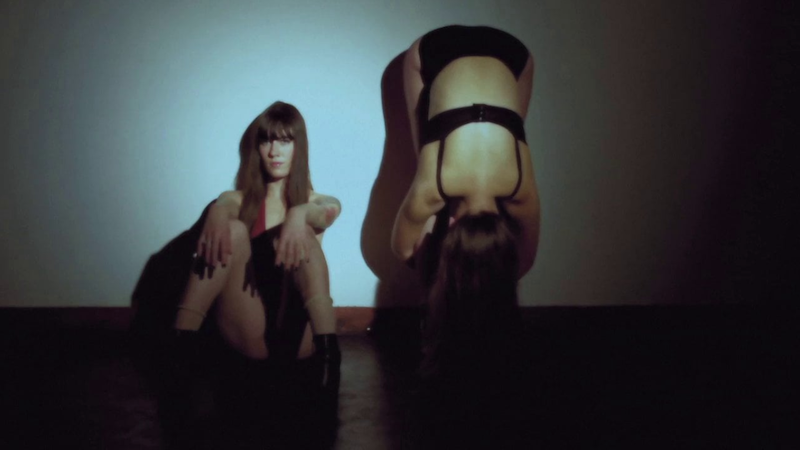
How would you describe your mission/interest/passion as an artist?
My early music videos were very much just me going on pure instinct, but I think a voice emerged from them. It turns out, I'm a bit of a feminist. Feminism wasn't trendy at the time, but I was very focused on women's topics... highlighting their stories and showing them in different ways. I kind of became a part of this conversation around the new female gaze. There's also a very dark side to me, as well. "EXIT" kind of combines these two sides and toes the line between darkness and beauty. I like to explore women's stories and their personal power.
I love the video you directed for "Sweetest Kill." I was checking out the comments on YouTube before this call and some of them are so pathetic. I guess a lot of people really take issue with a female murderer.
That music video was really polarizing - people either loved or hated it. I think it came out in 2011, when Internet trolls weren't really in the public consciousness yet. I was getting hate mail from men on Facebook. It was this feminine girl taking her power and killing and they were just not okay with that. Since then, every other music video features a woman killing people, but it didn't happen back then. I would get fan mail from women telling me how much they loved it. One even told me that she was writing a thesis on the video. The press didn't know how to take it, though.
Half the band hated it and were speaking out against it... it was crazy.
I remember when it came out but totally missed all of the controversy. My college friend group was very into the band.
Did your friends like it?
Most of my friends are radical feminists, so they were pretty into it. I'd say it was 80/20.
One of the guitar players (such a boring dude) spoke out against it but in the same interview admitted that he hadn't even watched it. It was insane and he ended up writing me a letter to apologize. I wrote back and was like, this is your most-watched video and people are actually talking about it. You're welcome!
Kevin Drew, the lead singer, and Justin Peroff, who I am friends with, were very supportive. It was a funny time.
How involved is the band when you're working on a music video? Do they have any say over the concept?
So many of my director friends pitch all the time on music videos and they're typically up against 30-40 other people. You can easily go years without landing one. My whole thing was that I didn't want to pitch on a ton of videos, so all of the ones I've made have been for friends. Basically, I pitch them ideas and they say yes or no. Sometimes they give thoughts to help shape it and talk about what's important to them – that's one route. I've also had record labels send me pitches with ideas already put together. For me, it's not realistic to churn out video after video. A lot of them are just like... people hanging out in neon lights and smoking. I don't have any interest in making that; I need to have something to say.
I could see you directing a video for Massive Attack.
I would love to! Do you know them? [laughs]
I wish. I'm obsessed with their videos. Are there any other directors that you love watching, either in film or the music video space?
I really love the auteurs. David Lynch has always been my number one... I feel an affinity with him. His work is weird and haunting but also has a lot to say. I guess him and David Cronenberg for their weirdo ideas. Lars von Trier and Michael Haneke have a bit of coldness that I admire. I think there's a bit of that in "EXIT." Lynne Ramsay and Sofia Coppola are great, too. Their work is unapologetically feminine but not in a "You go, girl" sort of way. Those are my top six. And Paul Thomas Anderson. I love that he can craft these super interesting stories. Ah, and Harmony Korine. I gravitate toward people with really strong voices.
It's nice to slip into a world that feels familiar. That's how I feel any time I watch something by Andrea Arnold or Ingmar Bergman. It's like putting on a comfortable sweater.
Yeah! I actually assistant styled this massive commercial that Harmony Korine was shooting. He was so lovely and kind... totally considerate to everyone on set and a pleasure to work with. He had such a strong vision and always knew what he wanted even though it was a commercial for like... Pfizer. It felt like a master class, though... a true gift from the universe during one of my last styling jobs.
I've worked with so many douchebag directors over the years and the ones with the egos are never good. They're totally insecure and have no clue what they want. Harmony just kind of cruised on up, was smiling, friendly, and treating everyone like equals. It was a blessing to be on that set. I was already directing at that point and definitely knew I wanted to be that way. Don't meet your heroes, but definitely meet Harmony because he's lovely!
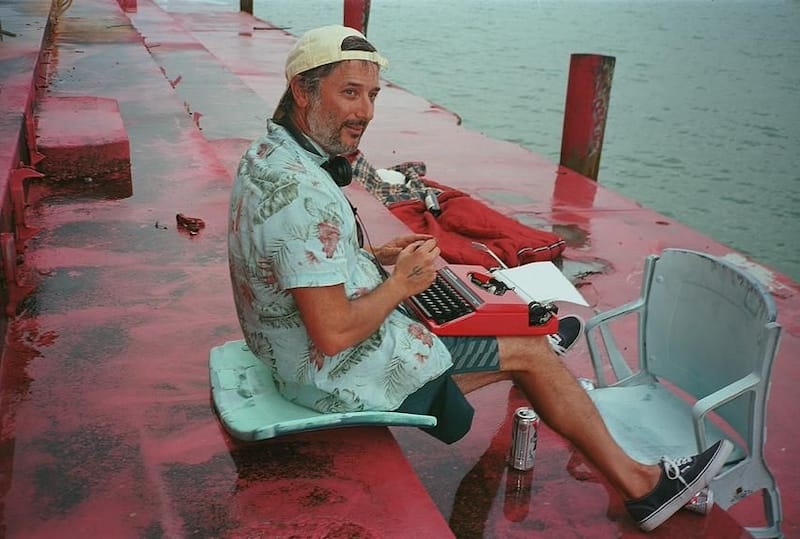
That's really great to hear. I'm always happy to find out that the people I love and look up to are not secret dicks. I hate transitioning from such a nice moment to something darker, but I want to know about the tough moments in your career. Have there been any times where you wanted to throw in the towel?
Oh yeah. It's the most sexist industry ever. At this point, I make my money from commercials and my goal is to move into TV and film. Hollywood has been forced to reckon with itself due to the high-profile cases... It started with Harvey Weinstein and trickled down. The positive after effects of the "Me Too" movement are being felt. I'm getting more meetings and being taken more seriously. Change is slow, but I think it's coming, and I see active steps being taken to achieve it.
The commercial industry is lagging behind the film industry. Sure, a creative director gets called out occasionally, but it hasn't been forced to reckon with itself the way the film industry has and therefore hasn't been forced to change. Some commercials I lose fairly and some just reek of a bias toward the male director. Alma Har'el is doing an excellent job with Free the Bid and trying to change that conversation, but there's still an ingrained unconscious bias that needs to be addressed.
I think most men aren't sexist, but they don't understand their role in contributing to equality. They just want to hire their bros instead of giving the job to a woman and can't see that this is sexist behavior. It's crazy. They need to be taught what is wrong and what is right. I've lost a lot of commercials to situations like that. It used to really depress me but I'm so focused on film and TV right now and am trying to ride the wave of momentum.
Are there any resources that you can recommend for women in film?
Women in Film LA are amazing... definitely check out that organization. More than anything, I think it's important to make friends with other filmmakers. It's so important to find a community and turn to them for support. I honestly think that's one of the best things you can do.
Creative people impress the hell out of me because there is SO MUCH networking and socializing involved. And you have to sometimes do uncomfortable things, like ask people for help or money. As women, I think we're conditioned to shy away from these conversations but you're right -- it's important to force yourself to do them.
It's hard. It's hard, but I don't know what else I would do.
